10+ Minimalist Infographic Resume Examples to Download
Let’s say you are walking around the city because you are unemployed, then you see a job fair flyer, so you try on your business-casual clothes and review your resume. However, you find that your outdated resume is quite disorganized, so you can’t emphasize your strengths, which is not ideal for applying for a new job. And editing a resume is not as straightforward as one would like. You need to think carefully on what skills and previous work experience can help you stand out from other applicants. If you have a large resume, it can easily turn-off employers, which is why it is best to keep things minimal, but you also need to apply some pizzazz. With that said, check out our wide collection of minimalist resumes with exciting designs to help you get started.
Minimalist Infographic Resume Examples and Templates
1. Minimalist Infographic Resume
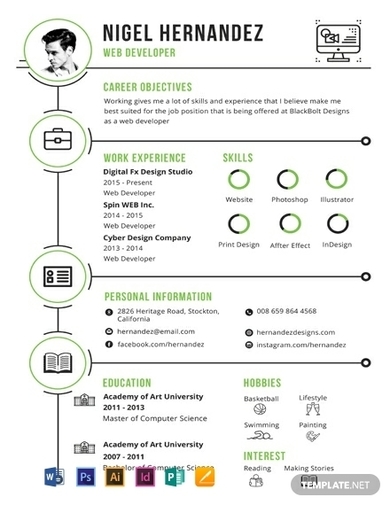
2. Minimalist Android Developer Resume
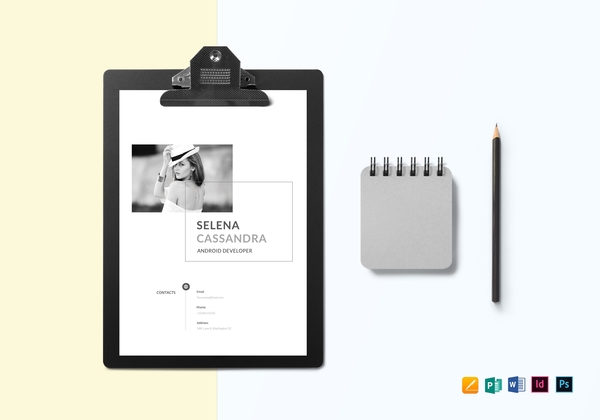
3. Infographic BPO Resume
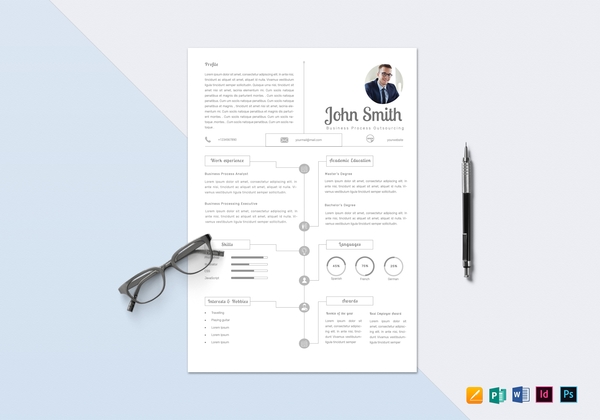
4. Charming Infographic Resume
5. Minimalist Resume with Sky Blue Infographics
6. Two-Color Minimalist Infographic Resume
7. Topographical Minimalist Infographic Resume
8. Bold Infographic Resume
9. Innovative Infographic Resume
10. Minimalist Infographic Resume in Pastel Colors
11. Neat Infographic Resume
The Value of a Minimalist Infographic Resume
One would think that having a three or four paged resume – filled with several skills, work experience, accreditations, etc., can help you stand out from your competitors. But, it is not quite part of any tips to impress your potential employer. Employers only need to know about your strengths and relevant work experience, not your entire life story. In this case, it is best to keep your resume at one or two pages maximum. However, the layout and design of your resume is just as important as its content. One of the better ways to showcase your skills is by using infographics. Yes, minimalism and infographics, if done right, can work together. Infographics provide a more eventful reading experience than a laying elements down in a list.
5 Things that You Should Not Include on Your Resume
1. Personal Information
Employers only care about your current or previous employee information. So, it is best to leave most personal information out of your resume. These include age, sexual orientation, race, marital status, religion, political affiliation, and citizenship. They are unnecessary and can ruin your resume instantly. On top of that, having these elements can lengthen your resume, which is not ideal, as mentioned earlier. The only personal information that you should include are your name, location, and contact information.
2. Irrelevant Hobbies
Much like the previous point, putting hobbies that are unrelated to the job you are applying for can also spoil your resume, and it can also make it lengthy. For example, you are applying for a social media consultant position. You should not include hobbies that are irrelevant to that position, such as being a basketball player, hiking expert, or binge watcher. You need to avoid these at all cost. Instead, put skills that are relevant to the job, such as writing, creativity, organizational efficiency, and digital marketing.
3. False Work Experiences or Accomplishments
Never put blatant lies on your resume. Employers can and will always do a background check on applicants to see if they are fit for the position and if the contents on their resumes are true. Honesty is the best policy. Only provide legitimate work experiences. If you do not have the qualifications that an employer is looking for in the job description, do not fabricate experiences. Rather, put what you can offer despite not having all the qualifications.
4. Outdated Job Experiences
In relation to the previous point, putting outdated or irrelevant work experiences can also damage your resume. In essence, you should not include all previous work. Again, as an example, you are applying for a head coach position for a sports team. Should you put on your resume your work past work experience as a delivery man? If your answer is yes, you should think otherwise. However, if you have a limited working experience, then you can put somewhat unrelated work, but make sure to inform your employer on how those jobs prepared you for the current one.
5. References
References on a resume are a complete waste of space. It is already known that if an employer shows interests in knowing more about your past working experiences, they will ask for a reference list. In this case, it is an applicant’s job to create a list of references ready to go when your employer needs it. So, after finishing your resume, start creating a separate document for these references.
FAQs
Is a one page resume the best option?
That would depend on your relevant work experience. For new applicants that do not have much work experience, a one page resume is more than enough. These are highly recommended for people who are just starting out in the job market. However, if you have more than ten years of relevant experience, you can go more than one page, but limit it to two pages.
What is the most important element on a resume?
You would think that the most important factor on a resume is the work experience, and you are not wrong for thinking that. However, the most important piece of information that you can put on your resume is the skills section. That is because even though you lack experience in that specific field, you should still have the skills that the job position requires.
Why is having a resume important?
That is because application letters are not enough to satisfy potential employers. A resume is your proof that you are the best candidate for a specific job. In essence, your resume can help you open doors to your future. It enables you to grab your employer’s attention. Most importantly, if you are looking for a job, a resume can help you land an interview.
A resume can help you create new windows of opportunities that can help you grow as a person and as an employee. That is why it is vital that you put time and effort into creating the best resume that highlights your skills and relevant experiences. With infographics, you can do exactly that! Infographics help you shape your content so that it is more engaging. On top of that, designing it in a minimalistic layout can help employers pinpoint where your vital information are without any hassle.
10+ Minimalist Infographic Resume Examples to Download

Let’s say you are walking around the city because you are unemployed, then you see a job fair flyer, so you try on your business-casual clothes and review your resume. However, you find that your outdated resume is quite disorganized, so you can’t emphasize your strengths, which is not ideal for applying for a new job. And editing a resume is not as straightforward as one would like. You need to think carefully on what skills and previous work experience can help you stand out from other applicants. If you have a large resume, it can easily turn-off employers, which is why it is best to keep things minimal, but you also need to apply some pizzazz. With that said, check out our wide collection of minimalist resumes with exciting designs to help you get started.
Minimalist Infographic Resume Examples and Templates
1. Minimalist Infographic Resume

Details
File Format
Illustrator
Pages
InDesign
Photoshop
MS Word
Publisher
Size: US Letter
2. Minimalist Android Developer Resume

Details
File Format
Pages
Publisher
MS Word
InDesign
Photoshop
Size: US Letter, A4
3. Infographic BPO Resume

Details
File Format
Pages
Publisher
MS Word
InDesign
Photoshop
Size: US Letter, A4
4. Charming Infographic Resume
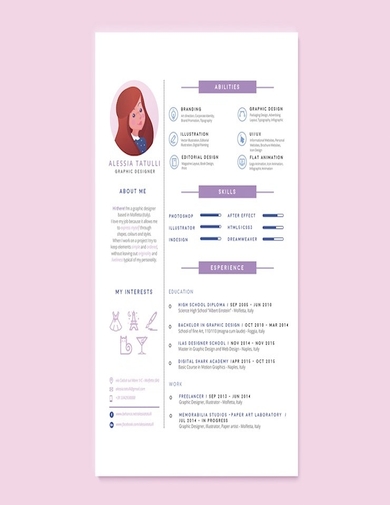
hipsthetic.com
Details
File Format
PDF
Size: 52 KB
5. Minimalist Resume with Sky Blue Infographics
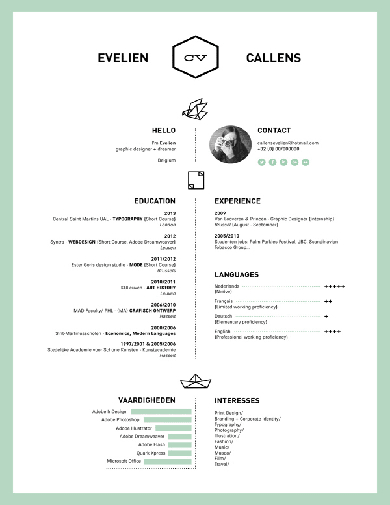
img.buzzfeed.com
Details
File Format
PDF
Size: 56.1 KB
6. Two-Color Minimalist Infographic Resume
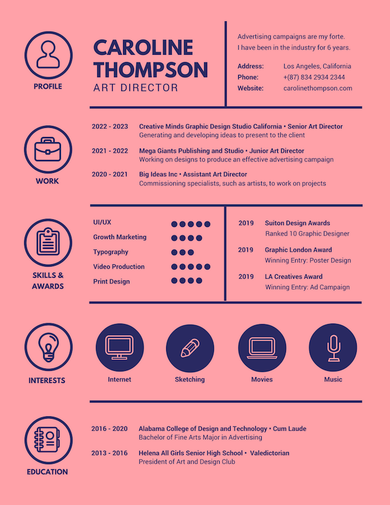
99designs.com
Details
File Format
PDF
Size: 31.6 KB
7. Topographical Minimalist Infographic Resume
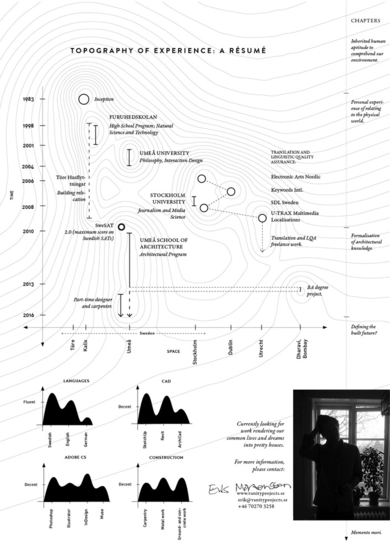
archdaily.com
Details
File Format
PDF
Size: 105.3 KB
8. Bold Infographic Resume
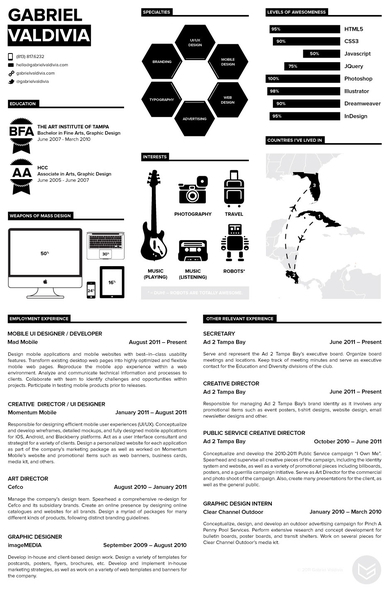
piktochart.com
Details
File Format
PDF
Size: 217.3 KB
9. Innovative Infographic Resume
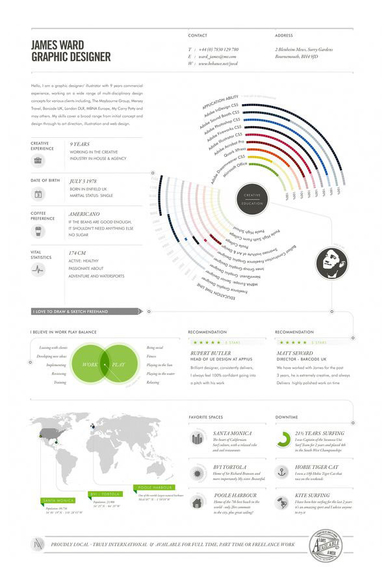
bashooka.com
Details
File Format
PDF
Size: 115.1 KB
10. Minimalist Infographic Resume in Pastel Colors
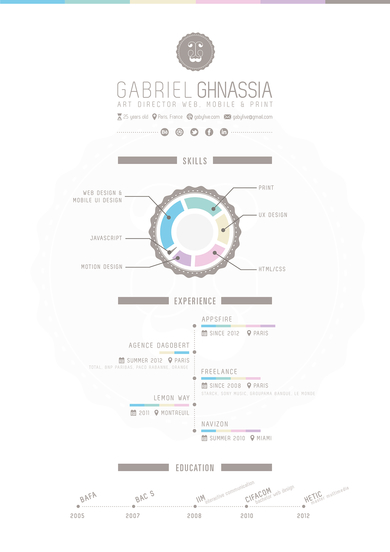
visme.co
Details
File Format
PDF
Size: 64.4 KB
11. Neat Infographic Resume
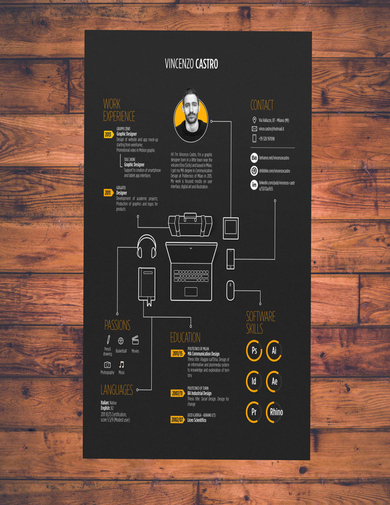
webdesignledger.com
Details
File Format
PDF
Size: 240.9 KB
The Value of a Minimalist Infographic Resume
One would think that having a three or four paged resume – filled with several skills, work experience, accreditations, etc., can help you stand out from your competitors. But, it is not quite part of any tips to impress your potential employer. Employers only need to know about your strengths and relevant work experience, not your entire life story. In this case, it is best to keep your resume at one or two pages maximum. However, the layout and design of your resume is just as important as its content. One of the better ways to showcase your skills is by using infographics. Yes, minimalism and infographics, if done right, can work together. Infographics provide a more eventful reading experience than a laying elements down in a list.
5 Things that You Should Not Include on Your Resume
1. Personal Information
Employers only care about your current or previous employee information. So, it is best to leave most personal information out of your resume. These include age, sexual orientation, race, marital status, religion, political affiliation, and citizenship. They are unnecessary and can ruin your resume instantly. On top of that, having these elements can lengthen your resume, which is not ideal, as mentioned earlier. The only personal information that you should include are your name, location, and contact information.
2. Irrelevant Hobbies
Much like the previous point, putting hobbies that are unrelated to the job you are applying for can also spoil your resume, and it can also make it lengthy. For example, you are applying for a social media consultant position. You should not include hobbies that are irrelevant to that position, such as being a basketball player, hiking expert, or binge watcher. You need to avoid these at all cost. Instead, put skills that are relevant to the job, such as writing, creativity, organizational efficiency, and digital marketing.
3. False Work Experiences or Accomplishments
Never put blatant lies on your resume. Employers can and will always do a background check on applicants to see if they are fit for the position and if the contents on their resumes are true. Honesty is the best policy. Only provide legitimate work experiences. If you do not have the qualifications that an employer is looking for in the job description, do not fabricate experiences. Rather, put what you can offer despite not having all the qualifications.
4. Outdated Job Experiences
In relation to the previous point, putting outdated or irrelevant work experiences can also damage your resume. In essence, you should not include all previous work. Again, as an example, you are applying for a head coach position for a sports team. Should you put on your resume your work past work experience as a delivery man? If your answer is yes, you should think otherwise. However, if you have a limited working experience, then you can put somewhat unrelated work, but make sure to inform your employer on how those jobs prepared you for the current one.
5. References
References on a resume are a complete waste of space. It is already known that if an employer shows interests in knowing more about your past working experiences, they will ask for a reference list. In this case, it is an applicant’s job to create a list of references ready to go when your employer needs it. So, after finishing your resume, start creating a separate document for these references.
FAQs
Is a one page resume the best option?
That would depend on your relevant work experience. For new applicants that do not have much work experience, a one page resume is more than enough. These are highly recommended for people who are just starting out in the job market. However, if you have more than ten years of relevant experience, you can go more than one page, but limit it to two pages.
What is the most important element on a resume?
You would think that the most important factor on a resume is the work experience, and you are not wrong for thinking that. However, the most important piece of information that you can put on your resume is the skills section. That is because even though you lack experience in that specific field, you should still have the skills that the job position requires.
Why is having a resume important?
That is because application letters are not enough to satisfy potential employers. A resume is your proof that you are the best candidate for a specific job. In essence, your resume can help you open doors to your future. It enables you to grab your employer’s attention. Most importantly, if you are looking for a job, a resume can help you land an interview.
A resume can help you create new windows of opportunities that can help you grow as a person and as an employee. That is why it is vital that you put time and effort into creating the best resume that highlights your skills and relevant experiences. With infographics, you can do exactly that! Infographics help you shape your content so that it is more engaging. On top of that, designing it in a minimalistic layout can help employers pinpoint where your vital information are without any hassle.

